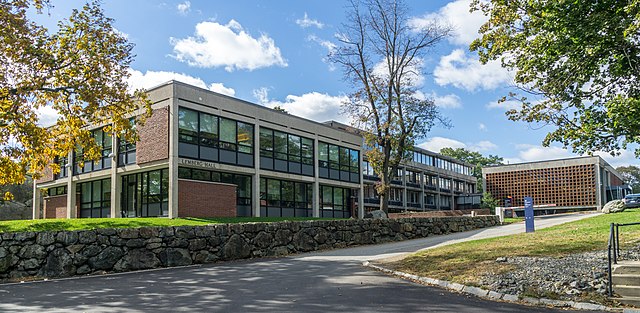The Enigmatic Acceptance Rate at Brandeis University
Brandeis University is a prestigious institution known for its academic excellence and commitment to intellectual
inquiry. Aspiring students often consider the acceptance rate as a crucial factor in assessing the competitiveness
of admissions. In this article, we will delve into the concept of acceptance rates, explore Brandeis University’s
acceptance rate, and analyze the factors that influence it.

Understanding Acceptance Rates
Acceptance rate refers to the percentage of applicants who are admitted to a university. It is an important metric
that reflects the selectivity of the admissions process. Acceptance rates are calculated by dividing the number of
admitted students by the total number of applicants, and they can vary among universities due to several factors.
Various elements influence acceptance rates, including the number of applicants, available spots, and institutional
policies. Highly selective universities tend to receive a large number of applications, leading to lower acceptance
rates. However, it is essential to note that acceptance rates alone do not determine the quality of education or the
suitability of a university for an individual student. They are just one aspect to consider when evaluating
institutions.
There are common misconceptions surrounding acceptance rates. Some believe that a low acceptance rate automatically
signifies a better university, but this is not always the case. Acceptance rates should be viewed in conjunction with
other factors such as academic programs, faculty, campus culture, and resources available.
Brandeis University: A Profile
Brandeis University, founded in 1948, is a private research university located in Waltham, Massachusetts. It is
renowned for its commitment to social justice, diversity, and academic excellence. The university offers a wide range
of undergraduate and graduate programs across various disciplines.
Brandeis University has consistently been recognized for its academic strengths. It has a strong focus on the liberal
arts and sciences, with renowned programs in fields such as economics, neuroscience, international relations, and
creative writing. The university fosters an environment of intellectual curiosity and encourages students to engage in
interdisciplinary studies.
In addition to its academic achievements, Brandeis University is known for its commitment to diversity and
inclusivity. The university actively promotes a diverse student body, faculty, and staff, ensuring that individuals
from all backgrounds feel welcome and supported.
Brandeis University’s Acceptance Rate: Past Trends
Over the past decade, Brandeis University’s acceptance rate has experienced some fluctuations. From 2010 to 2014, the acceptance rate ranged between 32% and 35%. However, in recent years, there has been a slight increase in the acceptance rate, with it reaching around 37% in 2020.
These changes in the acceptance rate can be attributed to various factors. One possible reason for the increase in acceptance rate could be a larger applicant pool. As Brandeis University’s reputation has grown, more students have been drawn to apply, resulting in increased competition for limited spots. Additionally, changes in institutional policies or adjustments in the admissions process may have influenced the acceptance rate.
When comparing Brandeis University’s acceptance rate to similar universities, it is important to consider the overall competitiveness of admissions. While the acceptance rate may be slightly higher than some other prestigious institutions, Brandeis University upholds rigorous academic standards and seeks to admit students who demonstrate exceptional potential and a strong fit with the university’s values.
Factors Influencing Brandeis University’s Acceptance Rate
Brandeis University takes a holistic approach to evaluating applicants, considering various factors beyond just academic achievements. While GPA and standardized test scores are important, they are not the sole determinants of admission.
Extracurricular activities, essays, and recommendation letters play a significant role in the admissions process. Brandeis University values well-rounded individuals who have shown dedication and leadership in their extracurricular pursuits. The essays provide an opportunity for applicants to showcase their unique perspectives, personal growth, and aspirations. Recommendation letters offer insights into an applicant’s character, work ethic, and potential for success at Brandeis University.
Demonstrated interest in Brandeis University is also considered during the evaluation process. Admissions officers look for applicants who have taken the time to research and understand the university’s mission, values, and academic offerings. This can be demonstrated through campus visits, attending information sessions, or engaging with the university’s online resources.
While Brandeis University strives to create a diverse and inclusive community, factors such as legacy status, geographic location, and socioeconomic background are not the sole basis for admission decisions. These factors may be considered to ensure a diverse student body, but they are not the sole determinants of acceptance.
Admissions Process and Selectivity
The admissions process at Brandeis University follows a step-by-step approach. Prospective students are required to submit their applications online, which typically include personal information, academic records, essays, recommendation letters, and any additional materials specific to their chosen program or major.
Brandeis University takes a holistic and comprehensive approach to evaluating applicants. Admissions officers carefully review each application, considering academic achievements, extracurricular involvement, essays, recommendation letters, and demonstrated interest. The university aims to admit students who not only excel academically but also contribute to the campus community through their unique perspectives and experiences.
Selectivity refers to the level of competitiveness in the admissions process. Brandeis University is considered a selective institution, with a rigorous evaluation process that seeks to admit students who demonstrate exceptional potential and a strong fit with the university’s values and academic community.
Prospective students need to understand that while the acceptance rate provides some insight into the competitiveness of admissions, it is just one aspect to consider. Brandeis University’s commitment to intellectual inquiry, social justice, and academic excellence should also be taken into account when evaluating the university’s suitability for individual students.
Frequently Asked Questions
What is Brandeis University’s current acceptance rate?
As of the most recent data available, Brandeis University’s acceptance rate is approximately 37%.
How does Brandeis University’s acceptance rate compare to other universities?
Brandeis University’s acceptance rate is slightly higher than some other prestigious institutions. However, it is important to consider the overall competitiveness of admissions and the university’s academic standards.
Can I improve my chances of acceptance by applying through Early Decision?
Applying through Early Decision can demonstrate a strong commitment to Brandeis University. However, it is important to note that Early Decision is binding, meaning that if admitted, you are obligated to attend. It is crucial to carefully consider this option and ensure that Brandeis University is your top choice before applying Early Decision.
Does Brandeis University have any specific admission requirements or preferences?
Brandeis University does not have specific admission requirements or preferences beyond the general application materials. However, it is recommended to review the specific requirements for your desired program or major, as certain programs may have additional requirements.
Is it more difficult to get accepted into certain programs or majors at Brandeis University?
Some programs or majors at Brandeis University may have more competitive admission processes due to limited spots or specific requirements. It is advisable to research the specific admission criteria for your desired program or major.
How important are extracurricular activities in the admissions process?
Extracurricular activities play a significant role in the admissions process at Brandeis University. The university values well-rounded individuals who have shown dedication, leadership, and a commitment to their interests outside of academics.
Does Brandeis University consider demonstrated interest when evaluating applicants?
Yes, Brandeis University considers demonstrated interest as part of the evaluation process. Engaging with the university’s resources, attending information sessions, and visiting the campus can demonstrate your interest and commitment to the institution.
What resources or support does Brandeis University provide to prospective students during the application process?
Brandeis University offers various resources and support to prospective students during the application process. These include virtual information sessions, campus tours, individual counseling sessions, and access to admissions representatives who can answer questions and provide guidance.
Are there any specific scholarships or financial aid opportunities available at Brandeis University?
Brandeis University offers a range of scholarships and financial aid opportunities to eligible students. These include merit-based scholarships, need-based grants, work-study programs, and loans. It is recommended to explore the university’s financial aid resources and application process for more information.
How can I schedule a campus visit or connect with current students at Brandeis University?
You can schedule a campus visit and connect with current students at Brandeis University through the university’s admissions website. They provide options for virtual tours, information sessions, and opportunities to connect with current students through online platforms.
Conclusion:
Understanding the acceptance rate at Brandeis University is an important aspect of the college admissions process. While the acceptance rate provides some insights into the competitiveness of admissions, it should be considered within the broader context of the university’s mission, values, academic strengths, and resources. Brandeis University, with its commitment to intellectual inquiry, social justice, and diversity, offers a vibrant and enriching educational experience. Prospective students are encouraged to conduct thorough research, engage with the university’s resources, and consider the holistic evaluation process when applying to Brandeis University. By doing so, students can gain a comprehensive understanding of the admissions process and make informed decisions about their educational journey.




